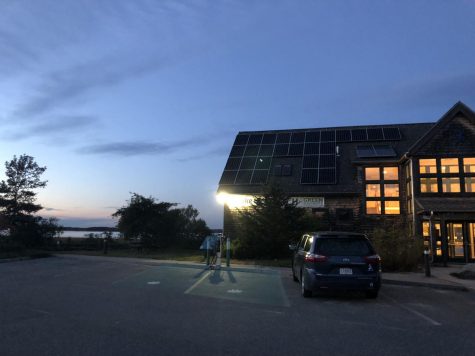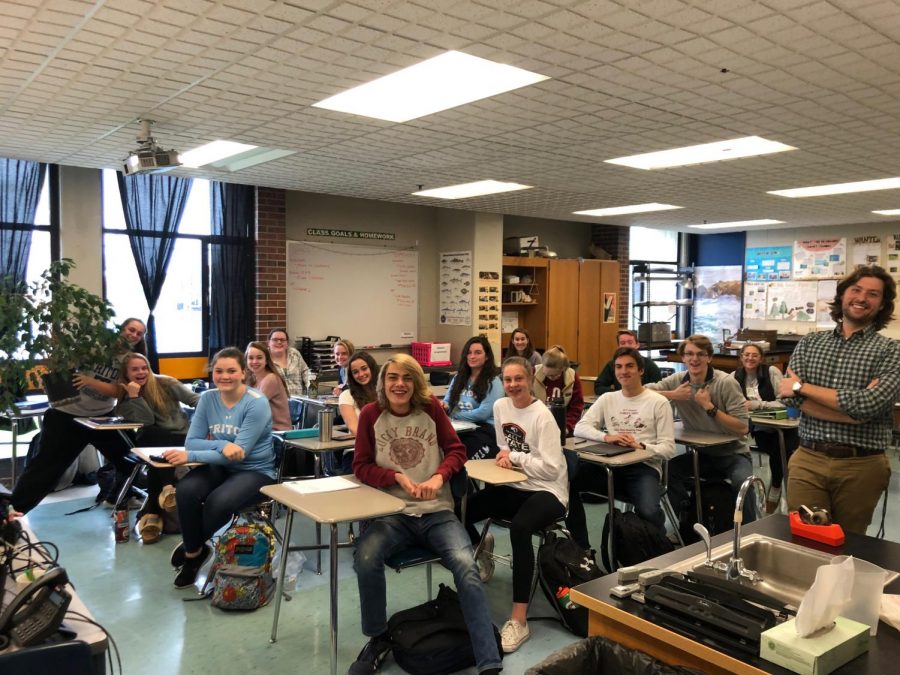A New Class for the Environment
Environmental science class aims to teach students the benefits of helping the environment
October 26, 2018
Environmental Science, helmed by Mr. Thomas Horsley, has been an increasingly popular course since it’s introduction three years ago with growing course enrollment. This year, an AP level course was introduced for those wishing to delve deeper into the subject.
“So far it’s very informative, it’s wholesome and educational. Mr. Horsley tries very hard to be a good teacher and role model, and I think he succeeds at that,” said current AP Environmental Student, Luc Metivier. “He’s a good man, I learn so much in his class.”
For the past two years, Environmental Science has been offered as a CP and Honors level course; this year, Horsley has undertaken the responsibility of teaching an AP-level course.
The course is largely built around lectures and lab-work. According to students enrolled in the class, lectures are given most days of the week, while labs are given intermittently to accompany the material being lectured.
Labs are developed by students working together with Horsley. An initial problem is posed, and a procedure and hypothesis is developed by the class, for the class to follow.
“I prefer to really soak up those experiences, and take the time that is needed to make those things worthwhile – as opposed to just doing something for the sake of doing it,” Said Horsley.
So far, students have conducted only one lab. They were given the task of trapping insects and measuring their diversity. The class then collaborated to create small traps constructed with petri dishes, fly paper, and bait, which were placed in varying places on the Triton campus. After counting and identifying the insects caught, a formal lab report was written by each group of students.
“It’s interesting because he is so passionate about this, and I think that really creates and interesting learning environment.” said AP Environmental student, Mike Fish.
Additionally, there is a community service requirement for those enrolled in the class. Students are required a total of 16 hours of environmental community service over the course of the year – a total of four hours per quarter.
“I’m really excited by the number of places you guys have landed,” said Horsley. “We’ve got a pretty big web of Triton students who are representing the school, myself, the Environmental Science program.
“It really gives you an opportunity to explore environmental science at a practical level, getting some real experience in the field with people who are actively involved within environmental science,” continued Horsley. “In that way, instead of learning the bold pages to pass the test, you’re really experiencing the field beyond the content.”
Local environmental organizations, such as Mass Audubon and Ipswich River have been more than gracious in accepting students who wish to fulfill community service requirements over the course of the year.
Students can expect to be doing anything from field research with organizations such as Ipswich River, to educating young children about our local marine ecosystems with Mass Audubon.

Mass Audubon Sanctuary on Plum Island Turnpike in Newburyport, where many students are volunteering.
Ainsley Marsh spoke about her experience volunteering with Ipswich River this past weekend with supervisor Ryan O’Donnell.
“Me and three other volunteers ended up wading through the Ipswich River and he was teaching us how to collect samples of the water and how to make sure that we get some of the species they were looking for.
“It was different than I expected – I was expecting a classroom setting, but we ended up being out in the field which was an interesting experience,” said Ainsley.
In addition to teaching the general content of the class, Horsley is preparing students for the AP test at the end of the year. However, he makes a point to teach the subject out of a passion for knowledge, rather than to fulfill a requirement.
“It’s always difficult when there’s a test at the end of the rainbow to cover all the material that that test could possibly cover,” said Horsley. “and that’s not something that I ever want to be a focus of AP, or whether I’m teaching a Freshman Bio class working towards MCAS.
“ I never want to have you guys thinking of this looming test at the end of the year, we want to be learning environmental science because we’re all interested in it, and really delving into it at a deeper level,” added Horsley.X
Students are given the chance to challenge their minds and push their limits to succeed in AP Environmental.
Students in the class have varying levels of experience with Environmental Science, some coming from Honors or CP classes last year, and other jumping right in for their first time.
“I haven’t had any troubles this year having not taken environmental last year, I’m cruising right along,” said Fish.
Students are accompanied each day in the classroom by two Ball Pythons named Dimitri, and Vicky, as well as a Day Gecko named Simone. These animals are class pets, and with some after-school training, coupled with parental permission, students are allows to handle the snakes, and feed Simone.
Horsley has been involved in the realm of Environmental Science for quite some time. Starting his studies at Gordon College, he earned his Bachelor’s degree in Biology. He then continued to Angelo State University in San Angelo, Texas to earn his Masters of Science in Biology, only to return to Gordon College once again to focus on his Masters degree in Secondary Education.
He also has a significant deal of experience with conducting field work in exotic ecosystems. For four years, Horsley studied bat species in Guyana, South America, as well as in Malaysian Borneo, and Honduras. His experiences are used to give meaningful context to the content learned in the course.
“I’m totally energized and super excited with the way things are going, and I think we have good things ahead.” said Horsley.



